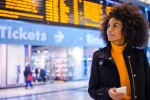When everything goes according to plan, traveling can feel like a dream come true. But when delays and cancellations happen, even the most experienced travelers can feel like they’re stuck in a nightmare. Fortunately, there’s a clever strategy that could save you from a travel disaster: the 1-3-1 rule.
This easy-to-follow rule could help you get a new booking quickly, ensuring your journey stays on track rather than being completely derailed. Scott Keyes, the founder and chief flight expert at the flight-deals app Going, explains how the 1-3-1 rule works and why it’s so effective.
What is the 1-3-1 Rule?
The 1-3-1 rule is a method designed to help travelers stay proactive when their flight plans go awry. Here’s how it works:
1: Stay informed with one travel app
Reliable travel apps like Flighty and FlightAware are essential for keeping you updated in real time on flight statuses, delays, and gate changes. Quick action is crucial when disruptions occur, as empty seats on alternative flights are given out on a first-come, first-served basis. By staying informed and acting fast, you increase your chances of securing a new flight. As Keyes explains, “Being first in line can make all the difference between a minor inconvenience and a lengthy delay.”
3: Triple your contact methods
When a flight disruption happens, you need to act quickly. Use three different methods to reach your airline:
- In person at the airport
- Via the airline’s app, website, or social media
- By calling customer service
It’s essential to use all three of these channels as soon as possible instead of waiting for a response from just one. Keyes recommends multitasking—while waiting in line at the airport, open the airline’s app to check flight-change options. Additionally, you can post your complaint on the airline’s social media accounts. Although social media isn’t as powerful as it used to be, it can still help get your issue noticed. Finally, call customer service. As Keyes notes, “You may be able to rebook yourself before you even reach the front of the line.”
1: Use a new federal resource
The U.S. Department of Transportation has created the Airline Customer Service Dashboard, a tool designed to hold airlines accountable for service disruptions. This dashboard outlines what airlines are legally required to do in case of delays or cancellations, such as providing compensation or rebooking passengers. If your flight is delayed or canceled, the dashboard can guide you on what compensation you’re entitled to, like meal vouchers or hotel stays.
In most cases, airlines are required to rebook passengers at no extra cost, including on partner airlines. If your new flight is delayed by more than three hours, you are often entitled to compensation, including meal vouchers and sometimes even travel credits.
Why is the 1-3-1 Rule So Effective?
The 1-3-1 rule works because it focuses on speed and covers multiple ways to secure a new flight. When Keyes encounters a flight disruption, he wastes no time. His strategy is all about efficiency.
He says, “I hustle to the line because it’s first-come, first-served.” While waiting, he opens the airline’s mobile app to see if he can rebook himself. If that doesn’t work, he calls customer service. “Phone agents have the same power to rebook you,” he adds.
Keyes has found this strategy successful time and again. “Nearly every time I’ve had a flight disrupted, I’ve been able to get a decent replacement flight—no dayslong waits—through an airline’s mobile app or by quickly getting in touch with an agent.”
Additional Tips for a Hassle-Free Travel Experience
In addition to the 1-3-1 rule, there are other strategies you can use to make your flights more stress-free.
1. Fly early in the day
Flight delays often cause a domino effect, with later flights being more likely to be delayed or canceled. By booking the first flight of the day, you reduce your chances of dealing with disruptions.
2. Avoid major holidays
Holiday travel brings more crowds, which increases the likelihood of delays and cancellations. If possible, try to travel before or after peak holiday periods.
3. Opt for larger airports
Smaller airports can struggle with major disruptions, especially in the case of weather events. Larger airports are better equipped to handle large-scale disruptions and offer more rebooking options.
4. Pack light
If your flight is delayed or canceled, checked baggage can often get lost or delayed as well. To avoid this, pack light and bring only carry-on luggage.
About Scott Keyes
Scott Keyes is the founder and chief flight expert at the flight-deals app Going (formerly Scott’s Cheap Flights). His app helps travelers find discounted flights and offers tips to navigate the world of air travel. Since 2015, Going has been helping people book affordable flights while avoiding the chaos of disruptions.
Conclusion
The 1-3-1 rule is a powerful strategy that can help you quickly find a new flight when disruptions occur. By staying informed, contacting airlines through multiple channels, and using federal resources, you can minimize the impact of delays and cancellations. In addition to this, simple tips like flying early, avoiding peak holidays, and packing light can help make your travel experience more seamless.
Disclaimer – Our editorial team has thoroughly fact-checked this article to ensure its accuracy and eliminate any potential misinformation. We are dedicated to upholding the highest standards of integrity in our content.





More Stories
Master the 1-3-1 Rule to Overcome Travel Disruptions and Get Back on Track
Master the 1-3-1 Rule to Overcome Travel Disruptions and Get Back on Track
Master the 1-3-1 Rule to Overcome Travel Disruptions and Get Back on Track